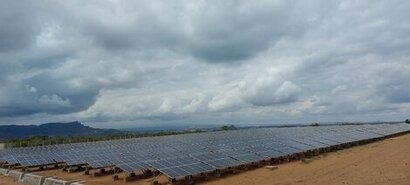
The completion of phase one, with a capacity of 2.4 MW will provide renewable energy to more than 3,900 people.
Phase two of the project, expected to be operational by April 2024, will provide another 5 MW of renewable energy, further reducing the carbon emissions of Madagascar’s energy supply. The hybridisation across the three Heavy Fuel Oil (HFO) plants is expected to mitigate the release of 17 million tonnes of CO2eq over the project’s full lifeline.
Combined with a pre-existing thermal power plant, the photovoltaic units will substitute the energy generated by HFO with renewable energy production, solving one of the largest issues that solar energy faces – namely, the intermittency of the sun. The hybridisation is able to guarantee a constant supply of energy to the national grid that is operated by JIRAMA, the state-owned electric utility and water services company in Madagascar.
The hybridisation of the thermal power plants is reducing costs for Groupe Filatex and JIRAMA, helping guarantee a stable source of electricity and ensuring that consumers are paying the most competitive price for their energy using the available resources.
“As Madagascar’s largest private energy supplier, we are working tirelessly to continue providing energy to as many Malagasy people as possible” said Hasnaine Yavarhoussen, CEO of Groupe Filatex. “The completion of Phase 1 at the Diego site is confirmation that our projects are furthering the sustainable development of Madagascar. The hybridisation of our heavy fuel oil plants with our solar panels will further expand the access to electricity in the city of Diego and help reduce the emissions produced as a result of Madagascar’s energy demands”.
Currently, 33 percent of Madagascar’s population has a stable and secure access to electricity, and Groupe Filatex is working to support the Government target of increasing energy access to 70 percent by 2030. The hybridisation of the Diego HFO power plant is part of Groupe Filatex’s larger ambitions to hybridise the majority of its thermal plants across Madagascar. Through the development of further renewable energy opportunities, Groupe Filatex is ensuring that Madagascar is able to achieve its sustainable development goals.
For additional information:

